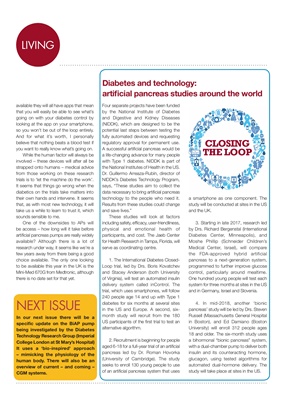
LIVINGLIVING
In our next issue there will be a
specific update on the BiAP pump being
investigated by the Diabetes Technology
Research Group (Imperial College London
at St Mary's Hospital) using a 'bio-inspired'
approach - mimicking the physiology of
the human body, as well as an overview
of current - and coming - CGM systems.
Four separate projects have been funded
by the National Institute of Diabetes
and Digestive and Kidney Diseases
(NIDDK), which are designed to be the
potential last steps between testing the
fully automated devices and requesting
regulatory approval for permanent use.
A successful artificial pancreas would be
a life-changing advance for many people
with Type 1 diabetes. NIDDK is part of
the National Institutes of Health in the US.
Dr. Guillermo Arreaza-Rubín, director of
NIDDK's Diabetes Technology Program,
says, "These studies aim to collect the
data necessary to bring artificial pancreas
technology to the people who need it.
Results from these studies could change
and save lives."
These studies will look at factors
including safety, efficacy, user-friendliness,
physical and emotional health of
participants, and cost. The Jaeb Center
for Health Research in Tampa, Florida, will
serve as coordinating centre.
1. The International Diabetes ClosedLoop trial, led by Drs. Boris Kovatchev
and Stacey Anderson (both University
of Virginia), will test an automated insulin
delivery system called inControl. The
trial, which uses smartphones, will follow
240 people age 14 and up with Type 1
diabetes for six months at several sites
in the US and Europe. A second, sixmonth
study will recruit from the 180
US participants of the first trial to test an
alternative algorithm.
2. Recruitment is beginning for people
aged 6-18 for a full-year trial of an artificial
pancreas led by Dr. Roman Hovorka
(University of Cambridge). The study
seeks to enroll 130 young people to use
of an artificial pancreas system that uses
Diabetes and technology:
artificial pancreas studies around the world
a smartphone as one component. The
study will be conducted at sites in the US
and the UK.
3. Starting in late 2017, research led
by Drs. Richard Bergenstal (International
Diabetes Center, Minneapolis), and
Moshe Phillip (Schneider Children's
Medical Center, Israel), will compare
the FDA-approved hybrid artificial
pancreas to a next-generation system,
programmed to further improve glucose
control, particularly around mealtime.
One hundred young people will test each
system for three months at sites in the US
and in Germany, Israel and Slovenia.
4. In mid-2018, another 'bionic
pancreas' study will be led by Drs. Steven
Russell (Massachusetts General Hospital
in Boston), and Ed Damiano (Boston
University) will enroll 312 people ages
18 and older. The six-month study uses
a bihormonal "bionic pancreas" system,
with a dual-chamber pump to deliver both
insulin and its counteracting hormone,
glucagon, using tested algorithms for
automated dual-hormone delivery. The
study will take place at sites in the US.
available they will all have apps that mean
that you will easily be able to see what's
going on with your diabetes control by
looking at the app on your smartphone,
so you won't be out of the loop entirely.
And for what it's worth, I personally
believe that nothing beats a blood test if
you want to really know what's going on.
While the human factor will always be
involved - they will after all be strapped
onto humans - medical advice from
those working on these research trials is
to 'let the machine do the work'. It seems
that things go wrong when the diabetics
on the trials take matters into their own
hands and intervene. It seems that, as
with most new technology, it will take us
a while to learn to trust it, which sounds
sensible to me.
One of the downsides will be access
- how long will it take before artificial
pancreas pumps are really widely
available? Although there is a lot of
research under way, it seems like we're a
few years away from there being a good
choice available. The only one looking to
be available this year in the UK is the MiniMed 670G from
Medtronic although there
is no date set for that yet.